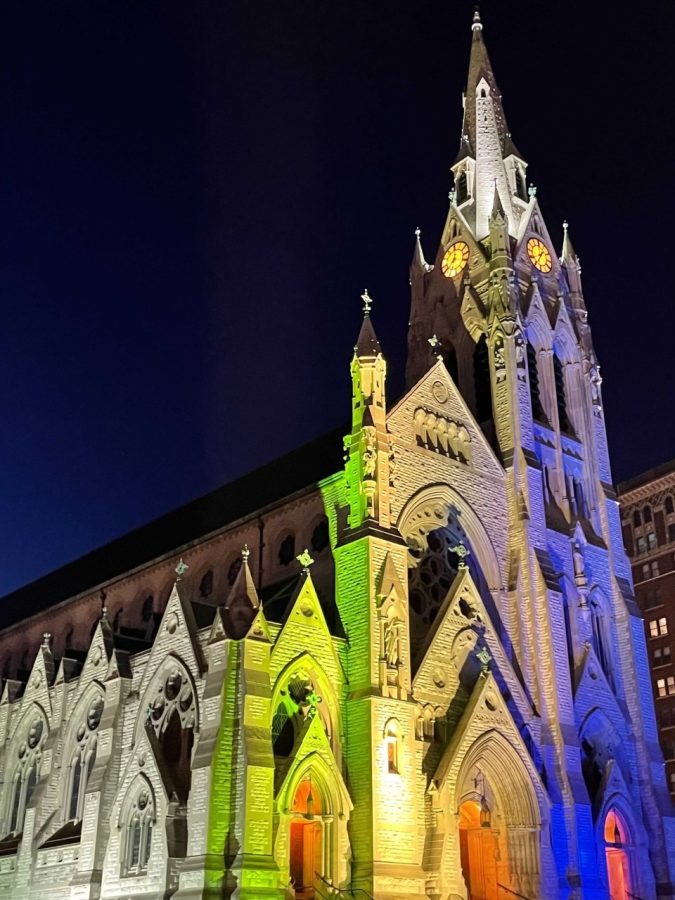Law Professor to Advocate Assisting Ukrainian Refugees
Monica Eppinger, Ph.D, J.D, a professor at the Saint Louis University School of Law, told the University News that she will call on SLU to assist Ukrainian refugees fleeing the Russian invasion.
“We should be so lucky as to get refugees from Ukraine,” Eppinger said. “This is not a burden. This would be a benefit.”
Eppinger, who served in the U.S. Embassy to Ukraine from 1995 to 1997, is an expert on both Ukraine and Russia, and teaches courses on international law and national security. Eppinger said she has been following the news closely since the war began on Feb. 24. She regularly returns to visit the country, where, by her estimate, one-third of her friends continue to live.
“The talent pool coming out of Ukraine is an extremely well-educated population, and it’s a population that universities can connect with,” Eppinger said.
Eppinger said her proposal will entail working with Catholic universities in Hungary, Poland and western Ukraine—the region she says will likely hold out the longest against the Russian invasion—to direct refugees to SLU.
“There are things we can do that would be creative and that would be in alignment with Pope Francis’ vision,” Eppinger said.
She floated the Ukrainian Catholic University in Lviv as one possible college SLU could work with.
“We could even try to target the communities that are the most like us: college-age students who are fleeing, or professors, or researchers,” Eppinger said.
On March 2, Eppinger hosted a “teach-in” event on Ukraine at the law school. Top-level college faculty, including university president Fred Pestello, Ph.D., have met with Eppinger in the past few days to get her insight on the war.
“May we extend care, support, and love to members of our SLU family who are suffering,” Pestello said in a March 1 email statement. “May we do whatever is in our power to mitigate suffering and to foster a place where curiosity guides our thoughts and becomes a salve that heals.”
The total number of refugees has already surpassed 1.5 million, according to the UN—an even more staggering figure considering that Ukraine, now under martial law, has required all men aged 18 to 60 to remain in the country. As Russian troops encroach westward, the number of refugees is expected to grow.
“Most Ukrainians that are fleeing now, they don’t want to live anywhere else,” Eppinger said. “They just want to go home when the war is over.”
Eppinger suggested the creation of a temporary “Ukrainian Study Center” at SLU as “a place where intellectuals could come together, and artists could come together, and students could come together.” She also proposed offering housing to refugees, and said if the war lasts through the summer or fall, she would support the creation of a scholarship for students and a short-term position for professors.
“On a local level, cities like St. Louis need to be prepared to step up to welcome Ukrainians,” Eppinger said.
Eppinger wants SLU to direct highly-educated refugees into sectors such that “the intellectual firepower that’s fleeing Ukraine right now doesn’t just get dissipated.” She posited that in addition to SLU, Ukrainians could find work in the Cortex, a Midtown tech-startup hub, or could work for the city government.
“There are ways that Saint Louis University, as the university that serves our city, could really help people coming out of Ukraine in ways that might benefit the city of St. Louis, even if we only had a temporary surge effort,” Eppinger said.
While Eppinger generally had high praise for the Biden administration’s response to the crisis, she criticized the administration for leaving behind 635 Ukrainian employees of the U.S. embassy and their families as American diplomats evacuated from Kyiv to Lviv, calling it “Kabul part two.”
“If we thought for the last six weeks that an invasion was coming, we should have been taking care of our Ukrainian colleagues. We have not yet, and those guys are in a really dangerous position,” Eppinger said.
She said she hopes that there will be demand at SLU for refugee assistance once she proposes her plan.
“I’m imagining if [the war] goes as long as this summer or into the fall, that there would be students at SLU interested in learning from Ukrainians,” Eppinger said.
Your donation will support the student journalists of Saint Louis University.




